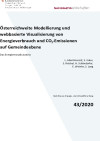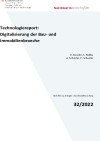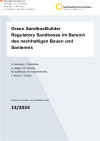Suchergebnisse
Build4Climate - Demonstration building with a climate room concept at the Innovation Quarter Lavanttal in Carinthia
Near the Wörthersee in Carinthia a modern open-space research and office building with flexible use is being built on the site of Lakeside Science & Technology Park GmbH. The innovative building will be implemented as a frontrunner with a 'climate room' concept based on thermal component activation and extensive use of renewable energy sources.
mAIntenance - Untersuchung von KI-gestütztem Instandhaltungs- und Energiemanagement
Optimierter & zuverlässiger Betrieb von Heizungs-, Lüftungs-, Klima- und Kältetechnik (HLKK) Anlagen hinsichtlich Instandhaltungs- und Energiemanagement mittels prädiktiver, datenbasierter & selbstlernender Fehlererkennung. Konzeptioneller Entwurf und prototypische Implementierung eines KI (Künstliche Intelligenz)-Tools zur automatisierten Datenanalyse und Empfehlungsgebung für das technische Gebäudemanagement.
mAIntenance - Investigation of AI supported maintenance and energy management
Optimized & reliable operation of Heating, Ventilation and Air Conditioning (HVAC) systems in terms of maintenance and energy management, using predictive, data-based & self-learning error detection. Conceptual design and prototype implementation of an AI (Artificial Intelligence) tool for automated data analysis and recommendations for technical building operators.
DIM4Energy - Digitale Informationsmodelle für die Planung und Optimierung von Gebäuden und urbaner Energieinfrastruktur
Digitale Informationsmodelle (DIM) spielen in urbanen Planungs- und Entscheidungsprozessen eine immer bedeutendere Rolle, angefangen bei einzelnen Gebäuden (Building Information Models, BIM) bis hin zu ganzen Städten (Urban Information Models, UIM). Für die Planung und Betriebsoptimierung von Plus-Energie-Quartieren könnten aus diesen bereits vorhandenen Modellen wertvolle Informationen gewonnen werden, sofern die entsprechenden Datenquellen und damit verbundenen Softwaretools richtig miteinander verknüpft würden.
GameOpSys - Gamification für die Optimierung des Energieverbrauchs von Gebäuden und übergeordneten Systemen
Zentrales Ziel ist die Entwicklung einer mobilen Anwendung, welche durch Partizipation des Nutzers und der Nutzerin als neue Daten- und Informationsquelle die Energieoptimierung und Planung von Gebäuden, Quartieren und übergeordneten Energiesystemen ermöglicht. Die Entwicklung der Anwendung erfolgt stark transdisziplinär und integriert dabei mathematische Methoden der Simulation und Optimierung sowie psychologische Aspekte des Nutzerverhaltens um neue Geschäftsmodelle zu erarbeiten und neue Märkte zu erschließen.
Digitaler Zwilling / Building Tracker - Kopplung der Gebäudesimulation mit physischen Gebäuden in Echtzeit
Ziel des Projektes ist die Kopplung eines Bürogebäudes in der Betriebsphase mit seinem virtuellen Zwilling, dem "Building-Tracker", der im Projekt entwickelt und erstmalig eingesetzt wird. Mit Hilfe der Kopplung von Monitoring und Simulation ist ein innovatives Gebäudeenergiemanagement zur Erreichung von nahe Nullenergiegebäuden möglich.
Green SandboxBuilder - Regulatory Sandboxes im Bereich des nachhaltigen Bauen und Sanierens
Im Projekt "Green SandboxBuilder" wurde erstmals in Österreich der Bedarf an Regulatory Sandboxes für ökologisch nachhaltige und klimawirksame Vorhaben im Baubereich systematisch erhoben. Die Umsetzung von Regulatory Sandboxes im österreichischen Bausektor kann dazu beitragen, die Einführung von technologischen, prozessualen und sozialen Innovationen entscheidend zu beschleunigen und somit die Nachhaltigkeitsziele zu erreichen.
Green SandboxBuilder - Regulatory sandboxes in the field of sustainable construction and renovation
In the "Green SandboxBuilder" project, for the first time in Austria, the need for regulatory sandboxes for ecologically sustainable and climate-effective projects in the building sector had been systematically explored. The implementation of regulatory sandboxes in the Austrian construction sector can contribute to decisively accelerating the introduction of technological, procedural and social innovations and thus to achieving the sustainability goals.
Digital Submission - Aufbereitung von Planungs- und Entscheidungsprozessen, Digitalisierung von Baubewilligungsverfahren (D-SUB)
Ziel des Projektes war es, die Grundlagen für die Implementierung von digitalen Ablaufprozessen für Baubewilligungsverfahren in der Steiermark zu erarbeiten und zu evaluieren. Grundbaustein war die Erfassung, Aufbereitung und Validierung der IST-Prozesse von Baubewilligungsverfahren am Beispiel der Stadt Graz und der Gemeinde Stainach-Pürgg.
Digital Submission - Preparation of planning and decision-making processes, digitisation of building permit procedures (D-SUB)
The aim of this project was to develop and evaluate the foundation for the implementation of digital processes for building permit procedures in Styria. The project started with the recording, processing, and validation of the actual processes of building permit procedures of the city of Graz and the municipality of Stainach-Pürgg.
BIMSavesEnergy - BIM-basierte Planungsmethoden zur Sicherstellung von Energie-effizienz im Bauprozess
Das Building Information Model (BIM) bewirkt grundlegende Veränderungen in Planung und Bau von Gebäuden, da durch die gemeinsame Datenbasis erstmals eine enge, organisationsübergreifende Zusammenarbeit in Bauprojekten möglich wird. In diesem Projekt wurden BIM-basierte Planungsmethoden entwickelt, die den Einfluss von Planungsentscheidungen auf die Energieeffizienz quantitativ bewertbar und im Managementprozess steuerbar machen.
Housing 4.0 - digital platform for affordable living
The main aim of this project is the development of an integrated framework for the digital platform "Housing 4.0"; thus supporting integrated planning and project delivery through coupling various digital tools and databases. Thereby, the potentials of BIM for modular, off-site housing assembly in order to improve planning and construction processes, reduce cost and construction time and allow for mass customization will be explored. The novel approach in this project is user-involvement; which has been neglected in recent national and international projects on off-site, modular construction, supported by digital technologies.
WOHNEN 4.0 - Digitale Plattform für leistbares Wohnen
Im vorliegenden Forschungsvorhaben wurde das Rahmenwerk für die digitale Plattform "Wohnen 4.0" entwickelt, welche durch eine Parameter-Datenbank und Koppelung digitaler Werkzeuge die integrale Projektabwicklung unterstützt. Der Fokus lag dabei auf der Entwicklung und Nutzung von BIM-Objektbibliotheken für die modulare Off-Site Produktion im Geschoßwohnbau. Erstmalig wurden auch Nutzer:innen beteiligt und dadurch der zunehmend wichtiger werdende Aspekt der Partizipation integriert.
Energiemosaik Austria - Österreichweite Modellierung und webbasierte Visualisierung von Energieverbrauch und CO2-Emissionen auf Gemeindeebene
Inhalt des Projektes ist eine alle Nutzungs- und Mobilitätsarten umfassende Modellierung und webbasierte Visualisierung von Energieverbrauch und Treibhausgasemissionen aller österreichischen Gemeinden. Die Ergebnisse können in zahlreiche energie- und klimarelevante Handlungsfelder integriert und für die Sensibilisierung von Entscheidungsträgern und Öffentlichkeit genutzt werden.
Digitization in the construction and real estate industry
In the multitude of digital possibilities, it is very difficult to maintain an overview, to assess trends and potentials, and to recognize correlations. This report therefore aims to describe the current state of the art and the market assessment of promising digital technologies. Information is provided on concrete use cases, added value and challenges of the respective technologies. The analyses presented serve to assess the potential and set the strategic course for the integration of the currently most important digital technologies in the construction and real estate industry.
Digital transformation of the Austrian construction industry and its impact on employment
What are the impacts of the digital transformation of the Austrian construction industry on this sector’s labour market? By looking at the next five to ten years it will be analysed whether and to what extent digital applications lead to an increasing, falling or stagnant demand for employees in the construction industry and in construction occupations.
M-DAB2: Materialintensität der Innenentwicklung - Ressourcenbewertung und Lokalisierung städtischer Entwicklungspotenziale
Bei der Bewertung von Innenentwicklungspotenzialen wurde erstmals auch die Materialintensität der Innenentwicklung (anfallende Stoffmengen) für unterschiedliche Entwicklungsvarianten berücksichtigt. Dabei wurde ein Methodenset zur holistischen Bewertung von Potenzialflächen und verschiedene Entwicklungsvarianten und -szenarien zur ressourcenschonenden Innenentwicklung geschaffen.
Energiemosaik Austria - Österreichweite Modellierung und webbasierte Visualisierung von Energieverbrauch und CO2-Emissionen auf Gemeindeebene

Inhalt des Projektes ist eine alle Nutzungs- und Mobilitätsarten umfassende Modellierung und webbasierte Visualisierung von Energieverbrauch und Treibhausgasemissionen aller österreichischen Gemeinden. Die Ergebnisse können in zahlreiche energie- und klimarelevante Handlungsfelder integriert und für die Sensibilisierung von Entscheidungsträgern und Öffentlichkeit genutzt werden.
Schriftenreihe
43/2020
L. Abart-Heriszt, S. Erker, S. Reichel, H. Schöndorfer, E. Weinke, S. Lang
Herausgeber: BMK
Deutsch, 56 Seiten
Downloads zur Publikation
Technologiereport: Digitalisierung der Bau- und Immobilienbranche

In der Vielzahl digitaler Möglichkeiten ist es nur sehr schwer möglich, einen Überblick zu behalten, Trends und Potentiale abzuschätzen sowie Zusammenhänge zu erkennen. Der vorliegende Report zielt daher darauf ab, den aktuellen Stand der Technik und die Markteinschätzung vielversprechender digitaler Technologien zu beschreiben. Es werden Informationen über konkrete Anwendungsfälle, Mehrwert und Herausforderungen der jeweiligen Technologien bereitgestellt. Die dargestellten Analysen dienen der Potentialbewertung und der strategischen Weichenstellung zur Integration der aktuell wichtigsten digitalen Technologien der Bau- und Immobilienbranche.
Schriftenreihe
32/2022
K. Künzler, S. Robbi, A. Schuster, P. Schuster
Herausgeber: BMK
Deutsch, 92 Seiten
Downloads zur Publikation
Green SandboxBuilder: Regulatory Sandboxes im Bereich des nachhaltigen Bauens und Sanierens

Im Projekt "Green SandboxBuilder" wurde erstmals in Österreich der Bedarf an Regulatory Sandboxes für ökologisch nachhaltige und klimawirksame Vorhaben im Baubereich systematisch erhoben. Die Umsetzung von Regulatory Sandboxes im österreichischen Bausektor kann dazu beitragen, die Einführung von technologischen, prozessualen und sozialen Innovationen entscheidend zu beschleunigen und somit die Nachhaltigkeitsziele zu erreichen.
Schriftenreihe
13/2024
G. Leimüller, J. Rohrhofer, A. Gerger, Ch. Schranz, M. Aichholzer, M. Schachenhofer, C. Benes, F. Ozclon
Herausgeber: BMK
Deutsch, 71 Seiten
